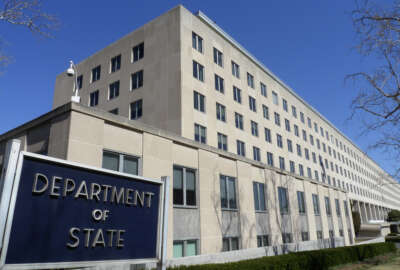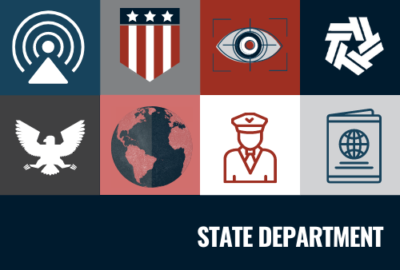

The United States is not as sharp at diplomacy as it needs to be. That's the chief finding of the American Academy of Diplomacy. Earlier this year it published a...
Best listening experience is on Chrome, Firefox or Safari. Subscribe to Federal Drive’s daily audio interviews on Apple Podcasts or PodcastOne.
The United States is not as sharp at diplomacy as it needs to be. That’s the chief finding of the American Diplomacy Project. Earlier this year it published a series of policy and practice recommendations for the State Department. They focus on the idea of multilateral diplomacy. For highlights, the Federal Drive with Tom Temin turned to two long-serving former ambassadors. Marc Grossman is vice chairman of the Cohen Group. Marcie Reis is now a national security consultant.
Mark Grossman: We had the great opportunity some years ago to be invited by Harvard University and the Belfer Center — Marcy, myself and two other colleagues — to do a report on modernizing the Foreign Service. And we did it, we were happy with it, we put out 10 recommendations altogether. And after listening to the response to those 10 recommendations, to thinking about how we could take them forward, Marcy and I both didn’t want to just leave that report where it was. We wanted to go forward. And so happily, Arizona State University, who has been a wonderful partner, stepped in to be the new institutional home for the document. And what we wanted to do was move then to four recommendations that we could really try to implement. And as you’ve seen, Eric, and I hope that your listeners will have a chance to see, we took these four, put out the narrative of what should change, and then what we hope is unique is that every single proposal has connected to it legislative and regulatory language. So if you wanted to do these things, there’s no excuse not to do it. And we hope that that’s a contribution to the conversation that’s going on about the modernization of the State Department, the modernization of American diplomacy.
Eric White: And you said you were approached, was this something that you both had been thinking about? Marcy, was this something that you and Mark and your other colleagues had been discussing? Like, we really do need to put out some ideas on how to modernize the Foreign Service?
Marcie Reis: Actually, I hadn’t, but when they proposed it to me, I thought, wow, this is a really good idea. And I wanted to be part of the effort. I spent 37 years in the Foreign Service. So I feel pretty deeply invested. And the idea of giving Foreign Service officers more opportunities, better tools, and more chances to do interesting things. I just thought, this is something I really want to be associated with.
Eric White: And in those 37 years, what did you — and obviously there are more details in the report — but just give me a broad sense of what you saw as ‘we really do need to modernize the workforce that is populating the Foreign Service and the State Department and also improving the roles themselves.’ What were some of your main takeaways from your career?
Marcie Reis: I think the area that most interested me was education. By that I mean professional education. In my career, I had introductory training, and language training. And then a wonderful course when I became a senior officer that lasted nine months, but nothing in between, no training at all. There was briefly a mid-level course, but it was cancelled after some years. So I thought it was really important to think more about this, especially because in my career, I work quite frequently with the military. And there, it’s understood that there will be career-long education for everyone in the military. We didn’t have that assumption. So that was one area that I was particularly interested in developing, and also developing opportunities for foreign service officers to study outside, to go to universities, to get degrees, because to me, we should be — we, the Foreign Service — should be the nation’s experts, on regions, on technical things that involve foreign policy, and we should give people the opportunity to really to deepen their knowledge.
Eric White: Mark, you seem to agree with the idea of continued development. What else did you see that you thought was an important aspect of being a good Foreign Service representative?
Mark Grossman: So I certainly agree with Marcie on professional education. I’d say also, and you noted it, Eric, in one of your previous questions, that what we tried to do also was highlight the things that would really do more for the Foreign Service, but we didn’t forget the civil service either. They’re a very important part, as you know, of the State Department. And we wanted to inspire them as well, and open up opportunities for them as well. The other thing that I wanted to try to emphasize were some themes that we put in both reports, but certainly go through this latest report. One was, as you can imagine, kind of a diverse workforce, diversity, equity and inclusion of a workforce that looks like America. We came back and back and back. This I found throughout my career: the State Department’s culture needs to change. So for example, on education, professional education, the culture has got to change so people value it and people want to be part of that educational system and are rewarded for it. So the culture has got to change. The other thing then, is this connection back to the American people. Again, your listeners, I think, will recognize that one of the challenges of American diplomacy is that people serve abroad. And people have a hard time sometimes explaining to people what it is that diplomats do. And so your listeners will see all through this report, connecting, connecting, connecting to the American people. And that’s why I’m so attracted, as Marcie is to professional education, I’m really attracted to the whole question of a reserve corps, so that like our military forces, we’ve got a surge capacity, the State Department can do things that it couldn’t do before. And very importantly, it’s a great connection to the American people.
Eric White: Reading over the report, it seemed as if you were putting importance on having a diplomatic reserve corps, like you said that you can kind of go to when experts are needed for any natural disasters or crises that happen. As somebody coming from the outside, is that not already happening? That kind of took me for a loop there. Can either one of you comment on that?
Marcie Reis: Of course, if there is an emergency, or disaster, or political emergency, we, the Foreign Service, steps up to it. But that often involves taking people out of their day job, and moving them to the emergency and leaving the day job vacant, which is definitely not ideal. So the idea of having a reserve corps is that if you need to surge, you have extra people who are ready, who are trained, who have the knowledge, have the language, whatever is necessary to meet that exigency.
Mark Grossman: Eric, I’d also say one of the things we tried to build into the reserve corps is it wouldn’t be just for crises. It would also be able, in small numbers, to bring in people that the State Department needed expertise and that it might not have. For example, if you needed people who are data scientists or people who knew about a lot about AI or machine learning. I’m not saying that Foreign Service and civil service people can’t learn those things; they can. But from time to time, maybe it would be great if you could call on the expertise from around this country for specialized items. And that’s why, as you saw in the report, we left open the possibility that people from academia, people from state and local government, people from all around the country could be called upon to act as reservists for both crises and for the kinds of information and expertise the department needs.
Eric White: We covered three out of the four aspects so far. And the other one I was interested in is holding diplomatic leadership to a standard of accountability and authority and responsibility. Can you all just explain a little bit about that? And tell me what you envision as having that as the standard set by the diplomatic service?
Marcie Reis: I think in the first instance, there’s the question of ambassadors and taking their responsibilities. There is a requirement in place when ambassadors are nominated for the President, actually, since the ambassador is that President’s representative, to say what the person’s qualifications are. Our report, we suggested really strengthening that statement that is put forward when someone is nominated to be an ambassador. And we have also written a new letter to ambassadors — maybe this is not so widely known — but when ambassadors take their posts, they receive a letter of instruction from the President in which he — or she, someday — tells them that what they ought to be doing, and what standards they need to live up to. It’s a rather profound document. So we have written a new letter that we think would strengthen the accountability, the performance, the authority, their understanding of the responsibilities of our ambassador.
Copyright © 2025 Federal News Network. All rights reserved. This website is not intended for users located within the European Economic Area.
Tom Temin is host of the Federal Drive and has been providing insight on federal technology and management issues for more than 30 years.
Follow @tteminWFED



